
Article provides objective ways to support an idea using logic, data, and non-emotional appeal to persuade others.
- Subject:
- Career and Technical Education
- Material Type:
- Reading
- Reference Material
- Author:
- Rob Furman
- Date Added:
- 05/22/2018

Article provides objective ways to support an idea using logic, data, and non-emotional appeal to persuade others.
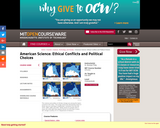
Explores the changing roles, ethical conflicts, and public perceptions of science and scientists in American society from World War II to the present. Studies specific historical episodes focusing on debates between scientists and the contextual factors influencing their opinions and decisions. Topics include the atomic bomb project, environmental controversies, the Challenger disaster, biomedical research, genetic engineering, (mis)use of human subjects, scientific misconduct and whistleblowing.
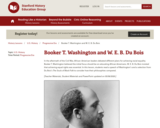
In the aftermath of the Civil War, African-American leaders debated different plans for achieving racial equality. Booker T. Washington believed the initial focus should be on educating African Americans. W. E. B. Du Bois insisted that achieving equal rights was essential. In this lesson, students read a speech of Washington’s and a selection from Du Bois’s The Souls of Black Folk to consider how their philosophies compared.
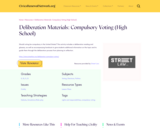
Should voting be compulsory in the United States? This activity includes a deliberation reading and glossary, as well as accompanying handouts to give students additional information on the topic and to guide them through the deliberation process from planning to reflection.
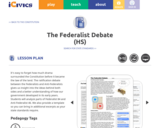
Website Description:
It’s easy to forget how much drama surrounded the Constitution before it became the law of the land. The ratification debate between the Federalists and Anti-Federalists gives us insight into the ideas behind both sides and a better understanding of how our government developed in its early years. Students will analyze parts of Federalist 84 and Anti-Federalist 46. We also provide a template so you can bring in additional excerpts as your state standards require.
Student Learning Objectives:
Students will be able to:
*Identify the arguments used by the Federalists and Anti-Federalists during the ratification debate
*Analyze excerpts from the Federalist Papers (#84) and Anti-Federalist Papers (#46)
*Describe the importance of the Bill of Rights in the ratification debate
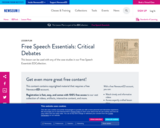
In this activity and set or resources from the Newseum ED, students grapple with free speech-related conflicts and controversies using real-life scenarios. They deepen their understanding by taking a position and supporting their arguments with evidence from a gallery of print and visual sources.
The lesson requires a free registration for Nesweum ED resources.

Students research and construct an oral debate about a topic related to Genetically Modified Organisms.

Students will learn about the four pillars of Drug Strategies our society uses to prevent, reduce the number of addicts, and the harm they place on our society; from deaths, disease transmission, crime, cost, etc. Once students understand each pillar and how these steps help prevent addictions they will focus on the forth pillar which is "Harm Reduction". Harm Reduction is very contraversal and fairly new in our society, especially with the Heroin Epidemic we are facing in our society. Harm reduction programs and practices aim to reduce the harms associated with the use of drugs in people unable or unwilling to stop. Harm reduction programs focus on limiting the risks and harms associated with unsafe drug use (HIV transmission, viral hepatitis, and death from overdose), decrease the cost on society and petty crime. Students will form personal opinions on three different types of Harm Reduction practices around the world and they work as a group to debate their view point.
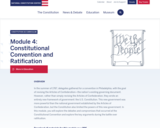
In the summer of 1787, delegates gathered for a convention in Philadelphia, with the goal of revising the Articles of Confederation—the nation’s existing governing document. However, rather than simply revising the Articles of Confederation, they wrote an entirely new framework of government: the U.S. Constitution. This new government was more powerful than the national government established by the Articles of Confederation, but the Constitution also limited the powers of this new government. In this module, you will explore the debates and compromises that occurred at the Constitutional Convention and explore the key arguments during the battle over ratification.
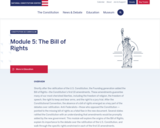
Shortly after the ratification of the U.S. Constitution, the Founding generation added the Bill of Rights—the Constitution’s first 10 amendments. These amendments guarantee many of our most cherished liberties, including the freedom of religion, the freedom of speech, the right to keep and bear arms, and the right to a jury trial. After the Constitutional Convention, the absence of a bill of rights emerged as a key part of the debates over ratification. Anti-Federalists—those who opposed the Constitution —pointed to the missing bill of rights as a fatal flaw in the new document. Several states ratified the Constitution with an understanding that amendments would be promptly added by the new government. This module will explore the origins of the Bill of Rights, explain its importance to the debate over the ratification of the U.S. Constitution, and walk through the specific rights enshrined in each of the first 10 amendments.

This is designed to have the students think critically about the immigration debate in the United States. This lesson allows the teacher to guide student driven discussion without coloring the debate with their personal opinion. This very difficult topic becomes easy to talk about with these students using this method.
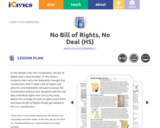
Website Description:
In the debate over the Constitution, the Bill of Rights was a deal breaker. In this lesson, students learn why the federalists thought the Constitution didn’t need a bill of rights and why the anti-federalists refused to accept the Constitution without one. Students will find out why individual rights was such a big issue, where the concept of a bill of rights came from, and how the Bill of Rights finally got added to the U.S. Constitution.
Student Learning Objectives:
Students will be able to:
*Identify arguments for and against the need for a bill of rights in the U.S. Constitution
*Explain why the Bill of Rights was added to the U.S. Constitution
*Describe how the Bill of Rights addresses limited government
*Relate the arguments over the need for a bill of rights to the wording of the first ten amendments to the U.S. Constitution
*Compare and contrast the fears on both sides of the argument over the need for a bill of rights
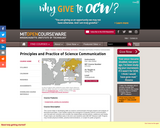
Develop skills as science communicators through projects and analysis of theoretical principles. Case studies explore the emergence of popular science communication over the past two centuries and consider the relationships among authors, audiences and media. Project topics are identified early in the term and students work with MIT Museum staff. Projects may include physical exhibits, practical demonstrations, or scripts for public programs.
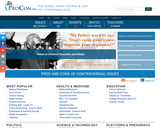
This website offers a free, reliable, and easily accessible source of information that shows both sides of today's controversial issues. It is created by a nonprofit public charity and has been online since 2004. The mission statement of this site is: "Promoting critical thinking, education, and informed citizenship by presenting controversial issues in a straightforward, nonpartisan, primarily pro-con format." The site follows strict guidelines for bias and strives to ensure that even the graphic and color choices won't sway you to one side of a topic or the other.
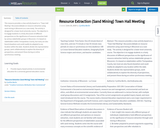
This resource provides a class activity based on a “Town Hall Meeting” discussion/debate on resource extraction using sand mining in Wisconsin as a case study. The activity is designed for a lower-level university course. The objective is to engage students in a lively discussion of different perspectives on the significance of resource extraction held by various stakeholder groups in Wisconsin. It is based on stakeholders within Trempealeau County, but many are also found elsewhere and could readily be adapted to any location within the state. Students divide into representative groups, work collaboratively to explore the diversity of perspectives, and present these during an online synchronous meeting.

" The science essay uses science to think about the human condition; it uses humanistic thinking to reflect on the possibilities and limits of science and technology. In this class we read and practice writing science essays of varied lengths and purposes. We will read a wide variety of science essays, ranging across disciplines, both to learn more about this genre and to inspire your own writing. This semester's reading centers on "The Dark Side," with essays ranging from Alan Lightman's "Prisoner of the Wired World" through Robin Marantz Henig's cautionary account of nano-technology ("Our Silver-Coated Future") to David Quammen's investigation of diseases that jump from animals to humans ("Deadly Contact")."
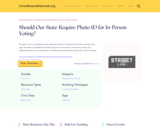
The right to vote is a fundamental right, protected by the U.S. Constitution. But there are limits to this right, and states can establish reasonable restrictions on time, place, and manner of voting. This deliberation lesson sets up the question of whether states should require a photo ID to vote at the polls.

This lesson allows students to explore the different sides associated with the issue of slavery. It can be used for either cross-content lessons between English and Social Studies, as part of an argument unit in English, or as part of a larger unit in Social Studies. The learning objectives for the lesson are that students are able to identify those who are for and against slavery, understand how people used the U.S. Constitution to support their reasons for/against slavery, and the economic argument for or against slavery.